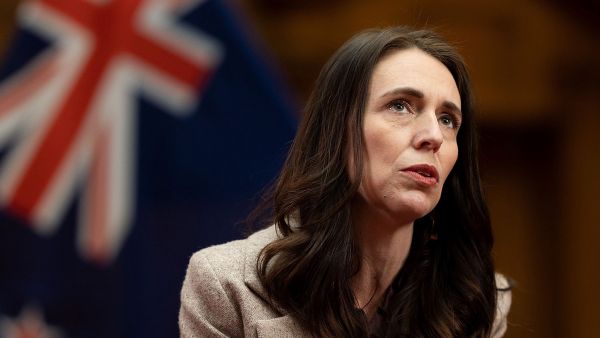Jacinda Ardern has placed the whole of New Zealand under the highest Covid alert setting after just 84 new cases in the country.
The red traffic light setting will begin from 11.59pm on Sunday after nine never cases of the Omicron variant were detected that were not linked to other cases.
'Omicron is now circulating in Auckland and possibly the Nelson area, if not further,' Ms Ardern said on Sunday.
"I am no different to, dare I say it, thousands of other New Zealanders who have had much more devastating impacts felt by the pandemic."#AWANInews #AWANITonighthttps://t.co/z5avJurcHJ
— ??Astro AWANI?? (@501Awani) January 23, 2022
Red is the highest level on New Zealand's traffic light system but stops short of a lockdown with domestic travel allowed to continue and businesses can stay open with significant restrictions.
'Even if your part of country doesn't yet have Omicrom yet, the evidence from overseas is that it moves very quickly,' Ms Ardern said.
'Our goal at red is to slow the spread of the virus with more mask wearing and physical distancing precautions.'
Masks are now required in hospitality and retail, schools, airports, public transport and public buildings.
While hospitality venues can stay open, a 100 customer limit will apply, with patrons needing to show their vaccine passport and stay seated.
Capacity limits also apply for retail and public buildings, and offices are encouraged but not required to bring in work from home.
New Zealand's vaccine passport dubbed My Vaccine Pass will be required by law to enter many venues.
A cap of 100 vaccinated attendees and 25 non-vaccinated will also apply for public and private gatherings with Ms Ardern adding her own wedding to her partner Clarke Gayford would be postponed.
New Zealand Prime Minister Jacinda Ardern was forced to call off her own wedding as she tightened Covid-19 restrictions in the face of an outbreak of the Omicron variant https://t.co/Ej6ObFkVP1
— AFP News Agency (@AFP) January 23, 2022
There is no change to the start of the 2022 academic year, however, all students and staff above Year 4 need to wear masks indoors.
'Our intention is for school to return as planned,' Ms Ardern said.
The red level declaration was sparked after several new Covid cases were confirmed to be the Omicron variant by genomic sequencing.
Omicron cases have been found in Auckland area on the North Island and the Nelson area on the South Island which have been linked to airport workers.
The prime minister said her government was working on a three-phase plan to get ahead of the Omicron variant.
Phase one is in place from Monday as cases remain under 1,000 a day and involves the red setting and encouraging the uptake of booster vaccine shots.
Ms Ardern said more details on phase two and three would be revealed later in the week but would involve large scale rollout of rapid antigen tests as cases reach the thousands along with changes to contact tracing.
'One task I explicitly request New Zealanders to undertake as quickly as possible is to get boosted,' she said.
''This reduces the likelihood of transmission and of going to hospital'.
'About 56 per cent of the eligible population have already have one booster, we need to get that higher before the virus takes off.'
Ms Ardern added there were no changes to the international border re-opening, which is scheduled for February 28.
On Saturday, Ms Ardern brought in harsher quarantine periods to battle the new variant.
Anyone infected with Covid is required to isolate for 14 days, up from 10 days, under the new interim rules.
Household contacts must then stay in quarantine for a further 10 days, stretching the isolation out to three and a half weeks.
But critics say the lengthy quarantine period was 'unworkable' and would lead people to avoid getting tested.
The NZ Ministry of Health said the changes were made after new scientific data published in Japan found the highly infectious strain had a longer incubation period than previous variants with sufferers also shedding the virus for longer.
'The effect is that if you test positive, members of your household may have to isolate for 24 days,' Act political party leader David Seymour told NZ's Stuff.
'People who cannot afford that will have a strong incentive not to get tested, defeating the purpose of the policy.
'If the advice is taken seriously, it will cripple the health workforce and supply chains more generally.'
This article has been adapted from its original source.









